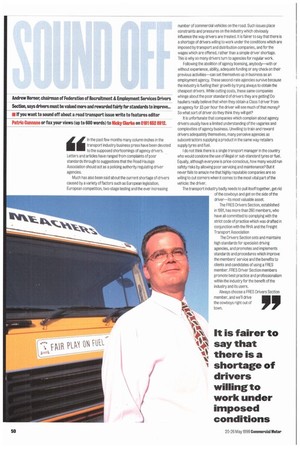Andrew Horner, chairman of Federation of Recruitment & Employment Services
Page 52

If you've noticed an error in this article please click here to report it so we can fix it.
Drivers Section, says drivers must be valued more and rewarded fairly for standards to improve_ • if you want to sound off about a road transport issue write to features editor Patric Cumin° or fax your views (up to 600 words) to Micky Clarke on 0181662 891E
di In the past few months many column inches in the
transport industry business press have been devoted to the supposed shortcomings of agency drivers. Letters and articles have ranged from complaints of poor standards through to suggestions that the Road Haulage Association should act as a policing authority regulating driver agencies.
Much has also been said about the current shortage of drivers caused by a variety of factors such as European legislation, European competition, two-stage testing and the ever increasing number of commercial vehicles on the road. Such issues place constraints and pressures on the industry which obviously influence the way drivers are treated. It is fairer to say that there is a shortage of drivers willing to work under the conditions which are imposed by transport and distribution companies, and for the wages which are offered, rather than a simple driver shortage. This is why so many drivers turn to agencies for regular work.
Following the abolition of agency licensing, anybody—with or without experience, ability, adequate funding or any check on their previous activities—can set themselves up in business as an employment agency. These second-rate agencies survive because the industry is fuelling their growth by trying always to obtain the cheapest drivers. While cutting costs, these same companies whinge about the poor standard of drivers they are getting Do hauliers really believe that when they obtain a Class 1driver from an agency for £5 per hour the driver will see much of that money? So what sort of driver do they think they will get?
his unfortunate that companies which complain about agency drivers usually have a limited understanding of the vagaries and complexities of agency business. Unwilling to train and reward drivers adequately themselves, many perceive agencies as subcontractors supplying a product in the same way retailers supply tyres and fuel.
I do not think there is a single transport manager in the country who would condone the use of illegal or sub-standard tyres or fuel. Equally, although everyone is price-conscious, how many would run safety risks by allowing poor servicing and maintenance? But it never fails to amaze me that highly reputable companies are SG willing to cut corners when it comes to the most vital part of the vehicle: the driver.
The transport industry badly needs to pull itself together, get rid of the cowboys and get on the side of the driver—its most valuable asset.
The FRES Drivers Section, established in 1991, has more than 260 members, who have all committed to complying with the strict code of practice which was drafted in conjunction with the RHA and the Freight Transport Association The Drivers Section sets and maintains high standards for specialist driving agencies, and promotes and implements standards and procedures which improve the members' service and the benefits to clients and candidates of using a FRES member. FRES Driver Section members promote best practice and professionalism within the industry for the benefit of the industry and its users.
Always choose a FRES Drivers Section member, and well drive the cowboys right out of town.




















































































































